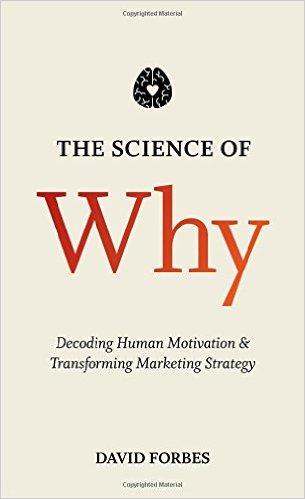INSIDER: The Science of Why
Andrew Miner
 It is said that people hate to spend money, but that they love to buy. And we do love to buy! Our purchases range from small perishable goods like chocolate all the way to investing in long-term, life-altering decisions such as owning a house.
It is said that people hate to spend money, but that they love to buy. And we do love to buy! Our purchases range from small perishable goods like chocolate all the way to investing in long-term, life-altering decisions such as owning a house.
But why? Why do we buy what we buy?
David Forbes explores why consumers make purchases—small and big alike— in his book, The Science of Why. In his MindSight Matrix, Forbes addresses nine unique reasons driving consumers’ final decisions to make changes and ultimately buy something.
The MindSight Matrix is a three-by-three grid that describes how consumers are motivated to makes changes in their lives. The columns showcase what area the individual desires for the change to take place: internally (the self), materialistically (objects) or externally (social world). The rows define what type of change the consumer seeks: change from the past, change for the present and change for the future. Let’s explore how various motivations are defined and how they impact the real estate purchase process.
|
|
INTRAPSYCHIC |
INSTRUMENTAL (The Object World) |
INTERPERSONAL (The Social World) |
|
EXPECTATIONS for the Future |
Security |
Empowerment |
Belonging |
|
EXPERIENCES in the Moment |
Identity |
Engagement |
Nurturance |
|
OUTCOMES from Past Behavior |
Mastery |
Achievement (Productive -> Defeated) |
Esteem |
Source: Forbes, The Science of Why
THINK POINT #1: Help Your Client Feel Safe and Secure
Intrapsychic motivation focuses on the self; consumers want to have a feeling of accomplishment that helps shape their identity. In his pyramid of needs, Abraham Maslow argues that there are levels of needs that an individual fulfills in order to become self-actualized. As a realtor, your focus should be on displaying how your client can reach that state of mastery through buying a home that is safe, secure and provides identity through community connections.
THINK POINT #2: Engage and Empower Your Client
Instrumental motivation revolves around the consumer’s wants – not needs – in the materialistic world. Residential realtors are home marketers and must showcase the unique features of a house after establishing the home’s security and connection to the community for the client. It is imperative that the real estate agent personalize the buying experience to the prospective home buyers envision themselves in those homes.
THINK POINT #3: Provide Your Client with Community
Interpersonal motivation ensures that your client finds the perfect community that will give the home buyer a sense of belonging, will nurture him and eventually lead to increased status for your client. The investment your client is making is not only material, but also personal. Just as additions can be made to a house, your client should expect to grow both individually and within the buying unit or family.
Putting the MindSight Matrix into Practice
So how does a company strategize using this matrix to successfully market to their targeted group of consumers? How does one deploy a campaign for a customer whose purchase will be far from transactional?
Real estate agents should emphasize key benefits of security, community and esteem for their clients, because home buyers are looking to make a long-term purchase that will keep them safe for years to come. Home buyers are motivated to join a loving community that will allow them to live and raise a family safely while expanding their personal networks and status.
A home is a major status symbol, representing an individual’s social status and wealth in society. The esteem that individuals gain from others in their community boosts their own self-confidence. Whereas the homeowner yearns to be a valuable addition in a nurturing community, he or she also yearns for the respect and status from others.
Security: Foundation for Life
Show your clients that your care for them and act as their trusted advisor. The security that they seek in a new home begins with the trust that they instill in their agent. You must be someone that they can trust in order for them to find and accept a community that they can trust.
Human beings can be insecure and worry about the unknown. As a realtor, knowing these concerns and objections ahead of time and creating a plan of attack for overcoming them can make a real difference in the sales process. Professional realtors have much greater experience in the home buying and selling processes and may “forget” the fears the home buyer is experiencing. Helping your client feel secure during the home buying process can build loyalty for the agent and yield security for the home buyer.
Community: Focus on the Person, Not Materialism
Your client’s self-identity can “morph” into the community identity over time, therefore it is imperative for your client to engage within the community of the home being considered. If a home buyer senses she can trust her fellow neighbors, she is more apt to move forward with a home purchase. Trusting the new neighbors can lead to individual and group achievements via networking and shared learning activities. The key for the real estate professional is to project how the community is a strong group where your client’s individual identity can grow though group engagement in a nurturing environment.
Esteem: Self-Actualizing Your Client
Forbes builds on Maslow’s theory and argues that esteem is the toughest motivation to satisfy for your client. In real estate, esteem can have two meanings. The first form of esteem is that of a status symbol and capturing envy of others. The second form is more altruistic where the person receives respect from others.

With any type of selling, a terrific real estate agent must be consultative, probing deep into the true reasons behind the client’s needs. Trust must be established prior to a potential homebuyer accepting that a house or community will be safe and secure to live in for years into the future as they take care of a family.
It is imperative to stress the benefits of living in the specific community that will allow new homeowners to develop their identity by engaging with others. This, in turn, allows for the new community members to gain the respect from their peers. For such a long-term investment for your clients, they must understand the value of their personal growth that will happen when they join the community.
To be an effective agent, know your clients’ personalities and what they would be looking for in a new home. Find out what will make them secure in their community, and sell them on the investment of increasing their position within the community.
. . . . . . . . . . . . . . . . . . .
Recommended Reading
Forbes, David (2015), The Science of Why, New York, New York: Palgrave MacMillan.
. . . . . . . . . . . . . . . . . . .
Reference
Maslow, Abraham H. (1943), “A Theory of Human Motivation,” Psychological Review, 50, 370-396.
. . . . . . . . . . . . . . . . . . .
About the Author
Andrew Miner, Business Account Executive
AT&T
Andrew graduated with a BBA in Professional Selling and a minor in Corporate Communications from Baylor University in 2015. He went on to graduate from AT&T’s Business Sales Leadership Development Program, a five-month sales and leadership boot camp in Atlanta, GA. He is currently working as an AT&T account executive in San Antonio, TX specializing in wireline, mobility and cloud solutions.